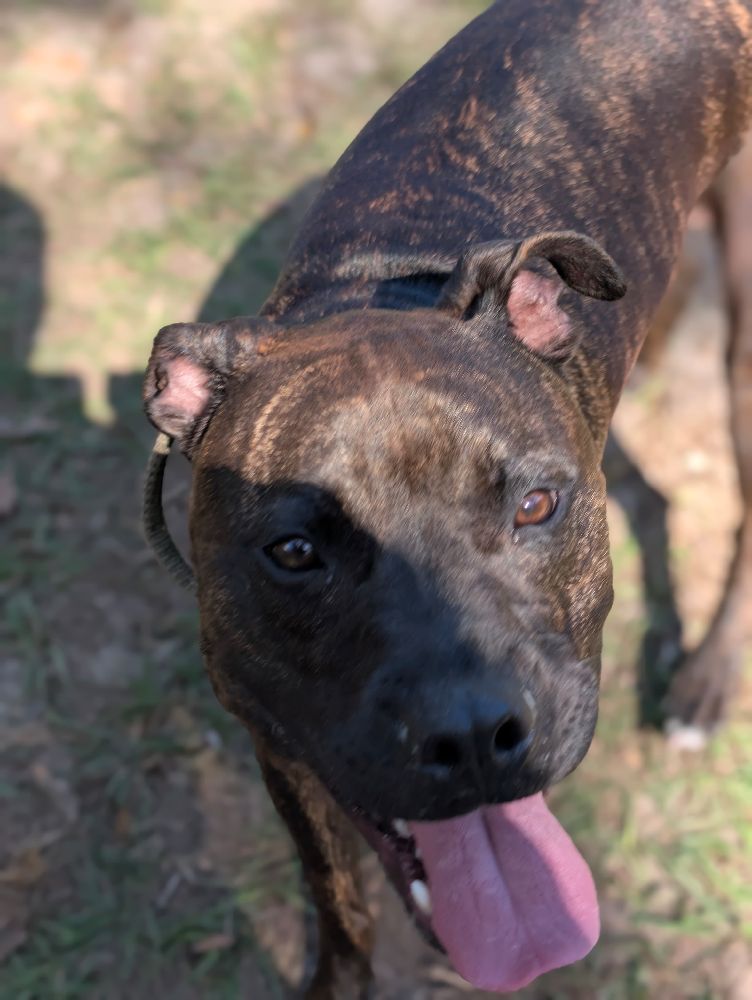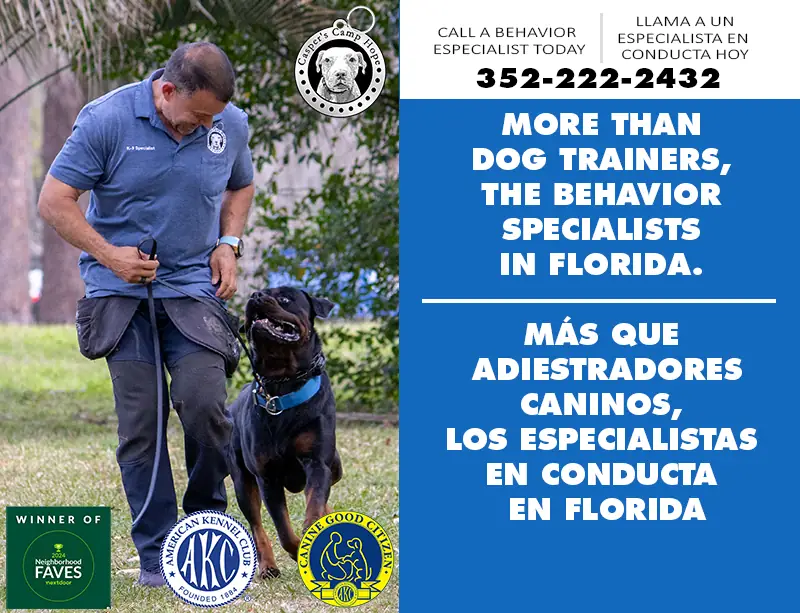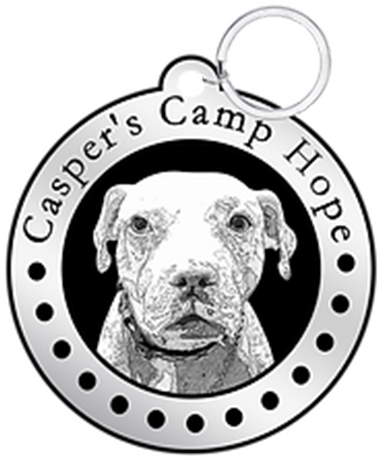Leash Reactivity: Why Your Dog Explodes on Walks (and What to Do)
If your dog barks, lunges, or hits the end of the leash every time you pass another dog, person, bike, or car, you’re not alone. Leash reactivity is one of the most common reasons people search for dog training Gainesville FL, leash reactivity training, and leash reactive dog training.

Put simply, you might be asking:
“Why is my dog freaking out on the leash, and how do I fix it without making things worse?”
That’s exactly what this guide is here to answer.
At Casper’s Camp Hope Dog Training – the behavior specialists in Florida, we work every day with leash‑reactive, anxious, and aggressive dogs through dog behavior modification, reactive dog boarding, anxious dog boarding, and reactive dog training classes for families in:
- Gainesville, FL (Haile Plantation, Duckpond, Suburban Heights, Millhopper, University Park)
- Alachua, High Springs, Newberry, Micanopy, Waldo, Hawthorne
- Trenton, Bell, Chiefland, Ocala, and surrounding neighborhoods
What Is Leash Reactivity, Really?
Leash reactivity means your dog overreacts to triggers while on leash, such as:
- Barking, growling, or whining
- Lunging or pulling hard
- Spinning, pacing, or freezing
Many owners assume this is pure aggressive dog behavior, but often it’s actually:
- Frustration – “I want to go say hi!”
- Fear – “That dog or person scares me.”
- Learned habit – It “worked” before, so your dog keeps repeating it.
Cornell’s Riney Canine Health Center notes that reactivity isn’t always aggression, but it can develop into aggression if it’s not addressed with proper training. That’s where dog behavior modification and aggressive dog management becomes essential.
The Science Behind Better Dog Training
A key study by Blackwell et al. (2008) in the Journal of Veterinary Behavior found that:
- Dogs trained with reward‑based methods showed fewer behavior problems
- Harsh, punishment‑based methods were linked to more aggression and fear
In practice, the most effective dog training for leash reactivity and aggressive dog modification relies on:
- Clear structure
- Consistent rules
- Reward‑based reinforcement
- Calm, confident handling
This is exactly how we design our dog training classes, dog obedience classes, and leash reactivity classes at Casper’s Camp Hope.
Why Leash Reactivity Can Be Worse Around Gainesville
If you live in or around:
- Gainesville, FL – Haile Plantation, Duckpond, Suburban Heights, Millhopper, University Park
- Alachua, High Springs, Newberry, Micanopy, Waldo, Hawthorne
- Trenton, Bell, Chiefland, Ocala
you already know our sidewalks, trails, and neighborhoods are full of:
- College students and families
- Joggers and cyclists
- Dogs of every size and breed
More activity means more triggers for a leash‑reactive dog. Without leash reactivity training and aggressive dog management, every walk can feel like a minefield.
Step‑by‑Step: How to Start Leash Reactivity Training at Home
Here’s a simple, science‑backed framework you can begin using right away.
1. Create Distance Before You Create Rules
For a leash‑reactive dog, distance is your best friend.
- Cross the street before your dog explodes
- Turn and walk away early
- Use parked cars, trees, or driveways as visual barriers
This isn’t “running away” – it’s smart dog behavior modification. You can’t teach calm behavior when your dog is already over threshold.
2. Reward Calm, Not Chaos
When your dog sees a trigger at a safe distance and:
- Looks back at you
- Sniffs the ground
- Walks calmly
mark and reward that behavior with food, praise, or a toy. This is the core of socialization for reactive dogs:
- “Dog appears → I stay calm → Good things happen.”
This reward‑based approach is exactly the kind of method supported by Blackwell et al.’s 2008 study.
3. Use Structured Dog Training Tools
In our dog training Florida programs, we may use tools like:
- Long lines for controlled distance
- Properly fitted collars
- Clear, consistent leash handling techniques
The goal is not to overpower your dog. It’s to create better communication, not just control.
4. Practice Short, Frequent Sessions
Instead of one long, stressful walk:
- Do multiple short sessions in low‑distraction areas
- Gradually add more triggers as your dog improves
- End sessions on a win, not a meltdown
This is how the best dog trainer thinks: build success, not frustration.
When to Consider Reactive Dog Boarding or Anxious Dog Boarding
Sometimes you need more than a few DIY sessions. That’s when reactive dog boarding and anxious dog boarding at a behavior‑focused facility can make a big difference.
Good candidates include dogs who:
- Explode at nearly every dog or person
- Have bitten or come close to biting
- Can’t settle at home after walks
- Live in busy areas like Haile Plantation, central Gainesville, or active Ocala neighborhoods
At Casper’s Camp Hope Dog Training, our board‑and‑train style programs combine:
- Leash reactive dog training Gainesville FL
- Aggressive dog training and aggressive dog modification
- Dog obedience classes and structured dog daycare
so your dog can practice calm behavior around real‑life triggers in a controlled environment.
Local Dog Training & Dog Daycare Options Around Gainesville
If you’re searching for:
- Dog training Gainesville FL
- Dog training Florida
- Dog trainer Florida
- Dog boarding or dog daycare
and you live in or near:
- Gainesville, Alachua, Newberry, High Springs
- Micanopy, Waldo, Hawthorne
- Trenton, Bell, Chiefland, Ocala
you want the best dog training and the best dog daycare with a deep understanding of behavior – not just basic obedience.
That’s where a behavior specialist makes all the difference.
Client Testimonial
“We live in Newberry and walks had become a nightmare. Our dog lunged at everything – people, dogs, even trash cans. After a leash reactivity program with Casper’s Camp Hope, he can walk through Haile Plantation calmly on a loose leash. The trainers didn’t just ‘correct’ him; they taught us how to read his body language and manage his triggers. This is the best dog training we’ve ever experienced.”
— Maria & Diego, Newberry, FL
FAQ: Leash Reactivity, Aggression, and Dog Behavior Modification
Q: Is leash reactivity the same as aggression?
A: Not always. Many leash‑reactive dogs are scared or frustrated, not truly aggressive. However, without proper dog behavior modification and aggressive dog management, reactivity can escalate into bites. That’s why leash reactivity training is so important.
Q: Can an older dog still learn?
A: Yes. The Blackwell et al. (2008) study and many others show that dogs of all ages respond well to reward‑based dog training. We regularly work with adult and senior dogs from Gainesville, Alachua, High Springs, and Ocala.
Q: How long does leash reactive dog training take?
A: It depends on severity and consistency. Many families see improvement within a few weeks of structured practice and/or reactive dog training classes, but serious cases may need longer‑term aggressive dog modification and reactive dog boarding.
Q: Do I need group dog training classes or private sessions?
A: For intense leash reactivity, we usually start with one‑on‑one behavior sessions or board‑and‑train, then transition to carefully structured dog training classes or leash reactivity classes once your dog has better coping skills.
Work with the Behavior Specialists in Florida
If you’re tired of planning your walks around your dog’s outbursts, it’s time to bring in a specialist.
Casper’s Camp Hope Dog Training – the behavior specialists in Florida offers:
- Science‑based dog training and dog behavior modification
- Leash reactive dog training and reactive dog training classes
- Reactive dog boarding and anxious dog boarding
- Structured dog daycare and dog boarding Gainesville FL
for families in Gainesville, Alachua, Trenton, Bell, Micanopy, Waldo, Newberry, Hawthorne, Chiefland, High Springs, Ocala, and surrounding neighborhoods.
Reach out today and let’s turn those stressful walks into calm, confident adventures.




